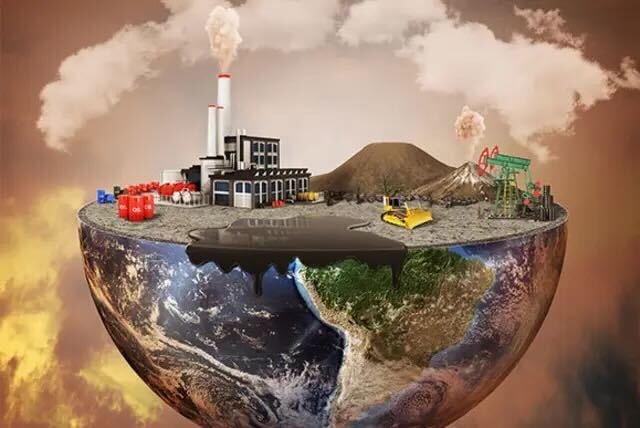Understanding and Solving the Climate Crisis Together
studiovin/Shutterstock
From the mechanical pencils we write with to the energy we use to power our homes, every facet of human civilization impacts our natural world significantly. Since the 20th century, humans have consumed more resources per year than civilizations have for centuries. Environmentally, humans are cutting down entire forests, polluting oceans with plastics, and drilling oil out of the ground. The consequences include rising sea levels, abrupt changes in weather patterns, more intense ‘natural’ disasters, and mass extinction of thousands of animal species.
For centuries, imperialist nations have violently extracted natural resources to fuel the production of consumer goods as a means to increase wealth. As a result, the manufacturing, exportation, and disposal of these goods have contributed to environmental destruction. The growth of capitalism has allowed powerful companies to extract labor and resources from developing countries without reaping any of the environmental costs. Greed, overconsumption, and ignorance of ‘developed’ nations complicate the relationship between economic development and its environmental impacts, driving deforestation, fossil fuel cultivation, and plastic disposal near marginalized neighborhoods. To add fuel to the flame, the lack of concern for these neighborhoods further exacerbate the challenges faced by lower income and communities of color during climate disasters.
The effects of climate change disproportionately impact poor, Indigenous, and Black people who have limited economic capacity to adapt from its consequences. They face increased vulnerability to water pollution, infrastructure damage from disasters, higher temperatures, food deserts, displacement, and health risks. These current systems of economic exchange, which exploit low-income and communities of color, mirror patterns established by historical structures of exploitation. For example, the transatlantic slave trade uprooted and forcibly enslaved millions of African people while extracting vast amounts of natural resources and wealth from the continent. The lasting impacts of slavery and colonial legacies have resulted in intrinsically linked racial inequalities today, affecting resources, political and social power, income, and access to opportunities. Disparities are evident, with disproportionately high poverty rates among Black communities, reaching 18.8% compared to 7.3% for white communities in 2019.
Consequently, people of color, particularly Black and Indigenous groups, bear a disproportionate burden of the effects of climate change. Gentrification and economic inequality have deprived communities of color the necessary infrastructure to protect them from natural disasters, amplifying the challenges they face. The ability to adapt to climate catastrophes varies significantly depending on individuals' economic standing and racial background.
People with low monetary wealth depend the most on natural resources, and are the first to be harmed by environmental deterioration caused by climate change. But, individuals in positions of power, who shape and develop policy, have little to no awareness or knowledge of the benefits of equitable environmental justice policies. While the solution might be to increase community engagement in such policies, discrimination and disinvestment create significant barriers for minority communities to access such decision-making processes. Therefore, it is crucial to incorporate people from all walks of life in the formation of strategic, sustainable, long-term planning to solve the climate crisis. Furthermore, our anthropocentric relationships with animals and natural resources must be reoriented to be one based on deep reverence to our planet. Taking robust action alone is insufficient; we require legislation and policies grounded in climate justice.
One of these new policies is the Green New Deal, an exemplary piece of congressional legislation that focuses on fighting the climate crisis, formulated by Representative Alexandria Ocasio-Cortez and Senator Ed Markey. This legislation focuses on tackling the climate crisis by focusing on racial and economic injustices, suggesting that climate change is not solely an environmental crisis. Climate justice examines inequities, historical grievances, and human rights as a means to solve climate change. By seeking to rectify historical damages, the Green New Deal adopts an intersectional approach towards solving the climate crisis. It aims to not only cut all greenhouse gas emissions by 2030, but to also uplift and empower communities of color through the creation of jobs, reparations, and the reduction of economic inequality. In order to mitigate the escalating economic, social, and ecological costs resulting from the failure to implement comprehensive climate policies, governments must collaborate with minority communities to alleviate their burdens. Thus, the Green New Deal serves as a perfect example of what an inclusive fight towards climate, economic, and racial justice looks like.
To address the climate crisis, it is crucial to recognize the historical and current injustices occurring in our nation and abroad, while also working towards equitable solutions. By understanding the intertwined nature of environmental degradation and racial inequality, we can develop inclusive strategies that prioritize the needs of marginalized communities. Implementing comprehensive climate policies with an environmental justice lens is essential to ensure a stable, sustainable, and just future for all. Together, by engaging with grassroots movements and demanding change from our governments, we can build a society that not only mitigates the impacts of climate change but also addresses historical grievances, promotes social equity, and fosters a harmonious relationship with the natural world.

